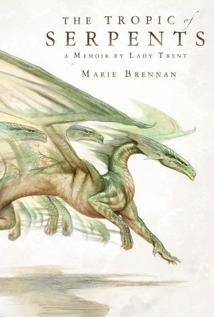
A Natural History of Dragons set out an interesting world. It’s more or less our world (although with all the names rewritten, so you’re always playing a game so is ‘xxx’ just like ‘yyy’), but with dragons. And of course the titular Isabela Trent just wants to study them, like any Natural Historian would!
Give me dragons any day; I understand their ways far better than those of my fellow human beings. We make our world much too complicated.
This time, we’re off to (not-)Africa, to a fantastic environment, full of bugs, swamps, water dragons, natives with their strange (to Isabela) customs, more dragons, more swamps, and an awesome waterfall.
Our home will eat you.
It’s a lot like the first book: setting off for a fantastic journey, then really digging into how the world (and specifically (but not only) Dragons) actually works.
“Would that I were a man,’” I said, quoting Sarpalyce’s legend. “Except that I do not wish I were a man. I only wish that being a woman did not limit me so.”
And this time around… even more POLITICS!
Science is not separate from politics. As much as I would like it to be a pure thing, existing only in some intellectual realm unsullied by human struggle, it will always be entangled with the world we live in.
It took her a while, but she got there eventually. 😄
One of the… kind of strange points about this book (minor spoilers, but it’s really from the first bit)… she has a son and just up and leaves him in England. I suppose it was of the time? But it still feels weird to me.
“And all the while I have people telling me, at least you still have something of your husband. Do they mean the book chronicling our work in Vystrana? No, of course not—never mind that we undertook that work together, with intent. That cannot possibly be as valuable as the accidental consequence of biology.”
Very quietly, Tom said, “Is not a child worth more than a book?”
“Yes,” I said violently. “But then for God’s sake let us value my son for himself, and not as some relic of his father. When he is grown enough to read, I will be delighted to share his father’s legacy with him; it is my legacy as well, and I hope he has inherited our curiosity enough to appreciate it. I would not mind a motherhood where that was my purpose—to foster my son’s mind and teach him the intellectual values of his parents. But no; society tells me my role is to change his napkins and coo over the faces he makes, and in so doing abandon the things I want him to treasure when he is grown.”
I expect/hope we’ll see more of that in the next one.
All together, I quite enjoyed this book. I expect if you liked (or didn’t) A Natural History of Dragons, you’ll like (or not) this one as well, it’s really more of the same (in a good way!).
Onward!